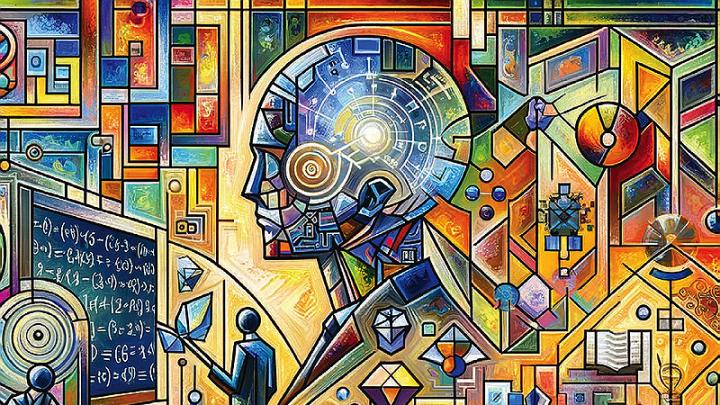With the launch of its first overview course on artificial intelligence this spring, the College has begun preparing students for the next technological revolution: a future of ubiquitous AI-generated tools and content often indistinguishable from that produced by humans. From the first meeting of Gen Ed 1188: “Rise of the Machines? Understanding and Using Generative AI,” students were introduced to the surprising capabilities of large language models (LLMs) such as ChatGPT-4, which turned a sketch on a napkin into a fully coded website, skillfully edited a text, created a book cover, and correctly identified a string of numbers in a spreadsheet as data from an experiment on a mouse form of Down syndrome. (The LLM then interpreted those experimental results and assessed their relevance to the analogous gene in humans.) “AI is an incredibly empowering tool that is going to permeate a lot of technologies,” says dean of science Christopher Stubbs, “and so we have an obligation at the undergraduate level to teach people how to use these tools responsibly, and, separately, to learn how to use these tools to improve student learning.”
Since becoming a dean, Stubbs has not had the bandwidth to teach, but says he assigned himself this class—an indication of the importance he and co-teacher Logan McCarty, assistant dean for science undergraduate education, ascribe to the subject. They showed students what LLMs can do, explained how they work, demonstrated how to use them effectively (how to write good prompts), and encouraged reflection on their pitfalls (such as bias and “hallucinations”—false statements presented as fact). The course also addressed the technology’s social impacts: potential job displacement and loss, privacy and copyright violations, and limited social and cultural representation, to take just a few examples.
LLMs, students learned, can perform tasks ranging from the petty to the profound. From a photo of bottles of alcoholic beverages on a countertop, ChatGPT can swiftly suggest drinks to be made from those ingredients. More consequential is the fact that the latest iteration of ChatGPT can pass the multi-state bar exam with a better score than the human student average, and its 10-day weather forecasts are better on average than sophisticated models that took years and cost millions to develop.
Although the subject matter was cutting edge, aspects of the course were decidedly old-school: no video recording was made of classes; attendance was mandatory. Each day began with a quiz, graded almost instantaneously by an AI teaching assistant; each week began with a survey, asking students to reflect on all the ways they had used ChatGPT since the last meeting. A 3,000-word term paper—planned, outlined, written, edited, critiqued, and ultimately graded with AI—provided students with firsthand experience of the advantages and shortcomings of AI tools for each stage of the process, and asked them to evaluate the technology as part of the task. (ChatGPT-4 is extraordinarily good at outlining and editing but limited in its ability to write drafts much longer than 500 words in a single session.)
The problem of bias was revisited repeatedly. Asked to create an image of a surgeon, ChatGPT almost always depicts a white man. Asked to generate a student recommendation from a resume, the AI tends to provide a more powerful endorsement when the resume bears a man’s name than when an identical document bears a woman’s. Deepfakes were another frequent topic, from the persuasive AI-generated audio of Joe Biden telling New Hampshire voters not to bother going to the polls for the Democratic presidential primary, to a video of a Ukrainian leader telling his fellow citizens that it was time to lay down their arms and surrender to Russia.
Taught about the mathematical underpinnings of current LLMs, students learned that “Generative Pre-trained Transformers” (GPTs) do not reason the way humans do; instead, they respond to specific prompts with deeply contextual answers that draw on a vast corpus of training data: a sort of relational database of human language and culture that required 21.5 quintillion floating point operations to compute on 25,000 graphical processing units (specialized semiconductors) running for three months or more. As in The Wizard of Oz—those great and mighty numbers notwithstanding—a glimpse behind the curtain at the man pulling the levers can be illuminating. Students thus learned not to mistake eloquence for intelligence.
But AI tools, even in their present form, are undeniably powerful. And they raise many “sociotechnological questions that are squarely in the domain of the humanities,” Stubbs says, spanning “philosophy, sociology, human nature, and the interface between people and machines. What are the ethics of use? How do you validate an answer? We’re at a place where even just crisply identifying the relevant questions is a big step forward. And one of the things that I hope will come out of the course,” he concludes, “is an appreciation of how fluid the technology is, and how social norms and expectations will evolve surrounding its use.”









